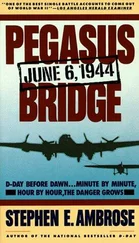Stephen Ambrose - Band of Brothers
Здесь есть возможность читать онлайн «Stephen Ambrose - Band of Brothers» весь текст электронной книги совершенно бесплатно (целиком полную версию без сокращений). В некоторых случаях можно слушать аудио, скачать через торрент в формате fb2 и присутствует краткое содержание. Жанр: История, на английском языке. Описание произведения, (предисловие) а так же отзывы посетителей доступны на портале библиотеки ЛибКат.
- Название:Band of Brothers
- Автор:
- Жанр:
- Год:неизвестен
- ISBN:нет данных
- Рейтинг книги:4 / 5. Голосов: 1
-
Избранное:Добавить в избранное
- Отзывы:
-
Ваша оценка:
- 80
- 1
- 2
- 3
- 4
- 5
Band of Brothers: краткое содержание, описание и аннотация
Предлагаем к чтению аннотацию, описание, краткое содержание или предисловие (зависит от того, что написал сам автор книги «Band of Brothers»). Если вы не нашли необходимую информацию о книге — напишите в комментариях, мы постараемся отыскать её.
Band of Brothers — читать онлайн бесплатно полную книгу (весь текст) целиком
Ниже представлен текст книги, разбитый по страницам. Система сохранения места последней прочитанной страницы, позволяет с удобством читать онлайн бесплатно книгу «Band of Brothers», без необходимости каждый раз заново искать на чём Вы остановились. Поставьте закладку, и сможете в любой момент перейти на страницу, на которой закончили чтение.
Интервал:
Закладка:
Webster, watching the men of the 4th Infantry come up from the beach and pass through E Company's positions, noted that they were "sweating, cursing, panting." He also recorded that the officers informed the men that "we cannot write about our Torquay excursion." In the afternoon, the company made a 25-mile march, then bivouacked in a woods for the night. In the morning of April 28, it rode in trucks back to Aldbourne.
That weekend Malarkey, Chuck Grant, Skip Muck, and Joe Toye got passes to London, with Muck's best friend from Tonawanda, New York, Fritz Niland of the 501st PIR. There they met Niland's brother Bob, who was a squad leader in the 82nd Airborne and who had seen action in North Africa and Sicily. They spent the evening in a pub listening to Bob Niland talk about combat. He made a remark that Malarkey never forgot: "If you want to be a hero, the Germans will make one out of you real quick—dead!" On the train going back to Aldbourne, Malarkey told Muck that it sounded to him like Bob Niland had lost his effectiveness.
Back in Aldbourne in the first week of May, E Company went through more problems, attacking gun positions, bridges, causeways, and other objectives, once attacking after a real jump, other times simulating the air flight and "jumping" out of trucks.
From May 9 to 12, the 101st held its dress rehearsal for D-Day, code name "Operation Eagle." The entire division participated. Easy used the same airfield it would use on D-Day, Uppottery. Personnel and equipment were loaded onto the same aircraft the company would use on the real thing; the takeoff, drop, and assembly followed the plan as close to the letter as possible, including spending the same amount of time in flight.2
Climbing aboard the C-47s was difficult, because of all the gear each man carried. Individuals were overloaded, following the age-old tendency of soldiers going into combat to attempt to be ready for every conceivable emergency. The vest and long drawers issued each man were impregnated, to ward off a possible chemical attack; it made them cumbersome, they stank, they itched, they kept in body heat and caused torrents of sweat. The combat jacket and trousers were also treated. The men carried a pocket knife in the lapel of their blouses, to be used to cut themselves out of their harness if they landed in a tree. In their baggy trousers pockets they had a spoon, razor, socks, cleaning patches, flashlight, maps, three-day supply of K-rations, an emergency ration package (four chocolate bars, a pack of Charms, powdered coffee, sugar, and matches), ammunition, a compass, two fragmentation grenades, an antitank mine, a smoke grenade, a Gammon bomb (a 2-pound plastic explosive for use against tanks), and cigarettes, two cartons per man. The soldier topped his uniform with a webbing belt and braces, a .45 pistol (standard for noncoms and officers; privates had to get their own, and most did), water canteen, shovel, first aid kit and bayonet. Over this went his parachute harness, his main parachute in its backpack, and reserve parachute hooked on in front. A gas mask was strapped to his left leg and a jump-knife/bayonet to his right. Across his chest the soldier slung his musette bag with his spare underwear and ammunition, and in some cases TNT sticks, along with his broken-down rifle or machine-gun or mortar diagonally up-and-down across his front under his reserve chute pack, leaving both hands free to handle the risers. Over everything he wore his Mae West life jacket. Finally, he put on his helmet.
2. Leonard Rapport and Arthur Northwood, Jr., Rendezvous with Destiny: A History of the 101st Airborne Division (Fort Campbell, Ky.: 101st Airborne Division Association, 1948), 68-69.
Some men added a third knife. Others found a place for extra ammunition. Gordon, carrying his machine-gun, figured he weighed twice his normal weight. Nearly every man had to be helped into the C-47. Once aboard, the men were so wedged in they could not move.
General Taylor had moved heaven and earth to get enough C-47s for Operation Eagle. The planes were in constant demand for logistical support throughout ETO, and Troop Carrier Command came last on the list. It was cheated on equipment. The fuel tanks did not have armor protection from flak.
Easy got its briefing for Eagle on May 10-11. The objective was a gun battery covering the beach. At dusk on May 11, Easy took off. The planes made "legs" over England, flying for about two-and-a-half hours. Shortly after midnight, the company jumped. For Easy, the exercise went smoothly; for other companies, there were troubles. Second Battalion Headquarters Company was with a group that ran into a German air raid over London. Flak was coming up; the formation broke up; the pilots could not locate the DZ. Eight of the nine planes carrying Company H of the 502nd dropped their men on the village of Ramsbury, line miles from the DZ. Twenty-eight planes returned to their airfields with the paratroopers still aboard. Others jumped willy-nilly, leading to many accidents. Nearly 500 men suffered broken bones, sprains, or other injuries.
The only consolation the airborne commanders could find in this mess was that by tradition a bad dress rehearsal leads to a great opening night.
On the last day of May, the company marched down to trucks lined up on the Hungerford Road. Half the people of Aldbourne, and nearly all the unmarried girls, were there to wave good-bye. There were many tears. The baggage left behind gave some hope that the boys would be back.
Training had come to an end. There had been twenty-two months of it, more or less continuous. The men were as hardened physically as it was possible for human beings to be. Not even "professional boxers" or football players were in better shape. They were disciplined, prepared to carry out orders instantly and un-questioningly. They were experts in the use of their own weapon, knowledgeable in the use of other weapons, familiar with and capable of operating German weapons. They could operate radios, knew a variety of hand signals, could recognize various smoke signals. They were skilled in tactics, whether the problem was attacking a battery or a blockhouse or a trench system or a hill defended by machine-guns. Each man knew the duties and responsibilities of a squad or platoon leader and was prepared to assume those duties if necessary. They knew how to blow bridges, how to render artillery pieces inoperative. They could set up a defensive position in an instant. They could live in the field, sleep in a foxhole, march all day and through the night. They knew and trusted each other. Within Easy Company they had made the best friends they had ever had, or would ever have. They were prepared to die for each other; more important, they were prepared to kill for each other.
They were ready. But, of course, going into combat for the first time is an ultimate experience for which one can never be fully ready. It is anticipated for years in advance,- it is a test that produces anxiety, eagerness, tension, fear of failure, anticipation. There is a mystery about the thing, heightened by the fact that those who have done it cannot put into words what it is like, how it feels, except that getting shot at and shooting to kill produce extraordinary emotional reactions. No matter how hard you train, nor however realistic the training, no one can ever be fully prepared for the intensity of the real thing.
And so the men of Easy Company left Aldbourne full of self-confidence and full of trepidation.
Easy's marshaling area in southwestern England, about 10 miles from the coast, was an open field beside the airstrip at Uppottery. The company lived in pyramidal tents. "Our standard of living went up considerably," Webster wrote. "We stuffed ourselves at the hospitable mess hall [a wall tent] ('Want some more, boys? Just help yourselves—take all you want.') on such luxuries as fried chicken, fruit cocktail, white bread with lots of butter. The realization that we were being fattened for the slaughter didn't stop us from going back for seconds."
Читать дальшеИнтервал:
Закладка:
Похожие книги на «Band of Brothers»
Представляем Вашему вниманию похожие книги на «Band of Brothers» списком для выбора. Мы отобрали схожую по названию и смыслу литературу в надежде предоставить читателям больше вариантов отыскать новые, интересные, ещё непрочитанные произведения.
Обсуждение, отзывы о книге «Band of Brothers» и просто собственные мнения читателей. Оставьте ваши комментарии, напишите, что Вы думаете о произведении, его смысле или главных героях. Укажите что конкретно понравилось, а что нет, и почему Вы так считаете.



![Stephen Ambrose - Citizen Soldiers [Condensed]](/books/346737/stephen-ambrose-citizen-soldiers-condensed-thumb.webp)
![Stephan Orth - Behind Putin's Curtain - Friendships and Misadventures Inside Russia [aka Couchsurfing in Russia]](/books/415210/stephan-orth-behind-putin-s-curtain-friendships-a-thumb.webp)





